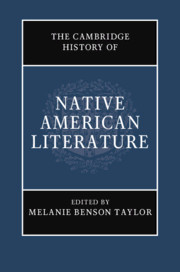Book contents
- The Cambridge History of Native American Literature
- The Cambridge History of Native American Literature
- Copyright page
- Contents
- Figures
- Contributors
- Introduction: What Was Native American Literature?
- Part I Traces and Removals (Pre-1870s)
- Part II Assimilation and Modernity (1879–1967)
- 7 The Multiplicity of Early American Indian Poetry
- 8 Native American Literature in the 1930s
- 9 Black-Indian Literature under Jim Crow
- 10 Transatlantic Modernity and Native Performance
- 11 American Indian Literature and Post-Revolutionary Mexico
- 12 I Kū Mau Mau (Standing Together): Native Hawaiian Literary Politics
- 13 Native Women’s Writing and Law
- Part III Native American Renaissance (Post-1960s)
- Part IV Visions and Revisions: 21st-Century Prospects
- Index
- References
11 - American Indian Literature and Post-Revolutionary Mexico
from Part II - Assimilation and Modernity (1879–1967)
Published online by Cambridge University Press: 18 September 2020
- The Cambridge History of Native American Literature
- The Cambridge History of Native American Literature
- Copyright page
- Contents
- Figures
- Contributors
- Introduction: What Was Native American Literature?
- Part I Traces and Removals (Pre-1870s)
- Part II Assimilation and Modernity (1879–1967)
- 7 The Multiplicity of Early American Indian Poetry
- 8 Native American Literature in the 1930s
- 9 Black-Indian Literature under Jim Crow
- 10 Transatlantic Modernity and Native Performance
- 11 American Indian Literature and Post-Revolutionary Mexico
- 12 I Kū Mau Mau (Standing Together): Native Hawaiian Literary Politics
- 13 Native Women’s Writing and Law
- Part III Native American Renaissance (Post-1960s)
- Part IV Visions and Revisions: 21st-Century Prospects
- Index
- References
Summary
Todd Downing (Choctaw), John Joseph Mathews (Osage), John Milton Oskison (Cherokee), Lynn Riggs (Cherokee), and Will Rogers (Cherokee) developed a transindigenous and transborder imaginary while travelling in Mexico in the 1920s and 1930s. The work of Riggs and Downing especially coheres in their conception of Indigenous Mexicans as political inspiration for (and, potentially, anti-colonial allies of) Native Americans, and in their critical challenge to modernist aesthetics, including primitivism. With its recent history of revolution, a new constitution with an article sanctioning land redistribution from large haciendas to communally owned ejidos, and a national commitment to indigenismo and mestizaje, which appeared to affirm the centrality of Indigenous Mexican culture and history to the nation’s identity, Mexico offered fertile political ground for American Indian writers looking for a path forward for their tribal nations in the final years of the assimilation era and the first years of the Indian New Deal in the mid-1930s.
Keywords
- Type
- Chapter
- Information
- The Cambridge History of Native American Literature , pp. 197 - 212Publisher: Cambridge University PressPrint publication year: 2020

